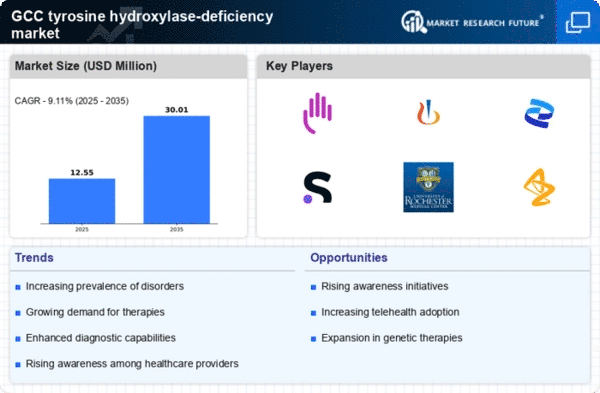Advancements in Diagnostic Technologies
Technological advancements in diagnostic tools are transforming the landscape of the tyrosine hydroxylase-deficiency market. Innovations such as next-generation sequencing and advanced biomarker identification are enabling earlier and more accurate diagnoses of this rare condition. The GCC region has seen a surge in the adoption of these technologies, with diagnostic laboratories increasingly equipped to handle complex genetic testing. This shift not only aids in the timely identification of affected individuals but also enhances the overall management of the disease. As a result, the demand for diagnostic services is expected to grow, thereby positively impacting the tyrosine hydroxylase-deficiency market.
Increased Investment in Biopharmaceuticals
The growing investment in biopharmaceuticals within the GCC is likely to drive the tyrosine hydroxylase-deficiency market forward. With a focus on developing innovative therapies for rare diseases, pharmaceutical companies are channeling resources into research and development. Reports indicate that the biopharmaceutical sector in the GCC is projected to grow at a CAGR of 15% over the next five years. This influx of capital is expected to facilitate the development of novel treatments for tyrosine hydroxylase deficiency, thereby expanding the therapeutic options available to patients and enhancing the overall market landscape.
Rising Incidence of Neurological Disorders
The increasing prevalence of neurological disorders in the GCC region appears to be a significant driver for the tyrosine hydroxylase-deficiency market. Recent studies indicate that the incidence of such disorders is on the rise, with estimates suggesting that approximately 1 in 10,000 live births may be affected by tyrosine hydroxylase deficiency. This growing patient population necessitates enhanced diagnostic and therapeutic options, thereby stimulating market growth. Furthermore, as healthcare systems in the GCC improve their capabilities, the identification and management of these rare conditions are likely to become more prevalent, leading to increased demand for specialized treatments and interventions in the tyrosine hydroxylase-deficiency market.
Collaboration Between Public and Private Sectors
Collaboration between public and private sectors is emerging as a crucial driver for the tyrosine hydroxylase-deficiency market. Partnerships between government entities, research institutions, and private companies are fostering an environment conducive to innovation and development. These collaborations often lead to shared resources, knowledge exchange, and joint ventures aimed at addressing the challenges associated with rare diseases. In the GCC, such partnerships are becoming increasingly common, with several initiatives launched to promote research and development in the field of genetic disorders. This synergy is expected to accelerate advancements in treatment options and improve patient care in the tyrosine hydroxylase-deficiency market.
Government Initiatives for Rare Disease Management
Government initiatives aimed at improving healthcare access and management of rare diseases are likely to bolster the tyrosine hydroxylase-deficiency market. In the GCC, various health ministries are implementing policies that promote research, awareness, and treatment options for rare genetic disorders. For instance, funding allocations for rare disease research have reportedly increased by over 20% in recent years. Such initiatives not only enhance the visibility of conditions like tyrosine hydroxylase deficiency but also encourage pharmaceutical companies to invest in developing targeted therapies. This supportive regulatory environment is expected to facilitate market expansion and improve patient outcomes in the tyrosine hydroxylase-deficiency market.
















